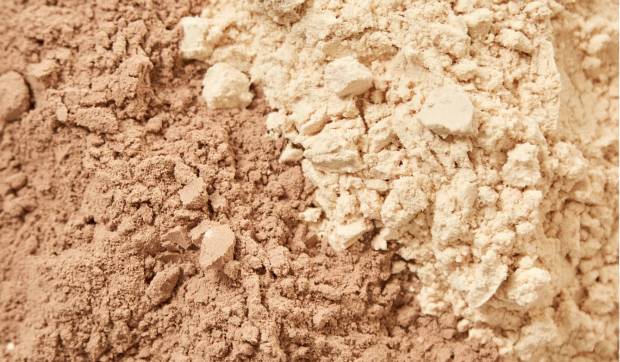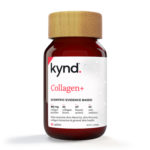The word ‘collagen’ originates from the Greek word ‘kolla’ which translates to ‘glue’. Pretty fitting considering collgen acts as the glue within our bodies holding everything together.
As the most abundant protein in our bodies, collagen can be found in our organs, skin, hair, nails, teeth, muscles, joints, tendons, cartilage.. You name it, it’s there.
RELATED: Turns out your blackheads might just be dark pores
RELATED: What does ‘non-comedogenic’ actually mean?
Well, at least until you hit the ripe age of 20, when your body begins to make less and less of the stuff for every decade that follows. And then age 40 rolls around and collagen production comes to a complete stop. Cue: wrinkles and sagging skin.
As the years progress and the natural production of collagen has all but ceased, potential problems far greater than crow’s feet can arise. Some in the form of conditions such as rheumatoid arthritis.
This should cause no panic, nor should you feel as though you are already too late to the party. As out of the 20 different types of collagen found in the body, there are only three types we actually need to worry about.
And luckily for us these are readily available both naturally in our diet and also via supplements, delicious powders and drinks that taste no different to a refreshing cordial.
What can I expect from collagen?
- Improved skin health, in particular a reduction in fine lines and wrinkles
- Restoration of joint cartilage, preventing deterioration and natural wear and tear
- Increased muscle mass
- Stronger bones
- Improved nail and hair growth
- Healthier gut flora
- Improved mood and reduced anxiety
What are the main factors sabotaging our collagen production?
Your first two decades of life are spent producing collagen in an abundance by your body. However a combination of age, lifestyle choices and environmental factors can play a role in destroying what has already been made.
Unhealthy behaviours such as smoking, high alcohol consumption, poor diet and excessive sun exposure will result in an accelerated ageing process.
Where can I find it naturally in my diet?
Fish – Also referred to as ‘marine collagen’ is the jelly part of a fish that sits just under its skin. Of all varieties of collagen, this is the most superior due to the way in which our bodies are able to break it down.
Bone Broth – Collagen is released from the bones when cooked down for long periods of time. Bone broth is also rich in amino acids and electrolytes, which hold their own skin benefits.
Eggs – The yolk of a chicken egg contains collagen.
Also good to know: Fruits and veggies such as berries, tomatoes, pumpkin seeds and avocados, as well as garlic, onions, shallots and leeks, contain minerals, vitamins and antioxidants which slow down and prevent the breakdown of already present collagen.
What is the most efficient way to incorporate collagen into my diet?
While there are many incredible food-based sources of collagen available, simmering a pot of bone broth for hours might not be the most practical for your lifestyle. Collagen in the form of a protein powder is a delicious and efficient way to meet your daily dose as it can be incorporated into your morning juice, smoothie or coffee.
bh recommends: Skin Physics Collagen Beauty Elixir, Dose and Co Collagen Creamer or Powder, Vida Glo Marine Collagen Powder Sachets
If you’re looking for an even quicker alternative, a collagen supplement might be your preference.
bh recommends: Kynd Collagen+, Nature’s Way Beauty Collagen Tablets, Nature’s Way Beauty Collagen GummiesWhat is the difference between marine and bovine collagen?
If you’ve been researching collagen products, you’ll no doubt have come across a few different types, including marine and bovine.
And while the different collagen varieties may seem self-explanatory – one is from the sea and one is from the land – there are a few factors to consider when weighing up the best type for you. Marine collagen is made from fish (namely fish skin and scales) and offers the most assistance when it comes to skin health and seeing a visible glow.
It’s primarily a Type I collagen, which is the strongest and most abundant form of collagen found in the human body, responsible for the formation of our bones, skin and surrounding tissues. Being the most bioavailable form of collagen, a marine variety will be the fastest to absorb, which means you can expect to see results quicker. However, it’s not suitable if you have a seafood allergy.
Bovine collagen, which comes from cowhides, offers a combination of both Type I and Type II collagen. Type II, not dissimilar to Type I, is the second most abundant collagen found in the human body. It promotes elasticity in the skin and supports a healthy gut and improved joint function. If you choose to go with the bovine variety, make sure you look for one that is grass-fed, as land animals (like cows) can be exposed to a higher risk of contamination. Choosing grass-fed ensures you are consuming the cleanest variety of bovine collagen available.
Main image credit: @doseandco
Do you take a collagen supplement or powder? If not, will you try one?








Not something I’ve tried, I usually take silica tablets for hair,skin and nails.
I like collagen in bone broth and in some brands of protein powder. Yum!
I recently tried collagen powder and was impressed with the results, my hair and skin looked much better, just wish it wasn’t so expensive.
The ones you can buy now seem to be getting so expensive, it sure is the big trend at the moment, you know, promise nice skin and hair and we will jump and buy it, but will it work???
Collagen production is optimal when one eats right for human metabolism. Fruits boost collagen production and strengthen bones (improving bone density , higher the intake of thereof is. So cool) Proven in clinical studies, but oh so logical. On the other hand, eating animal remains in powders, boiled in water etc…have been researched and proven to have zilch impact.
Thanks BH for the information regarding collagen try to eat most of the foods that are rich in collagen, but I haven’t tried collagen Supplements at all because most of the time they are very expensive to buy.
I’ve heard that collagen supplements actually don’t help so I prefer to just eat a balanced diet
I chuck a couple of teaspoons of hydrolysed collagen in with my protein shakes. I originally bought it for my dog who has awful arthritis but I took it for some knee pain of my own, and it has really helped. Being vegetarian, it is quite possible that I don’t get enough collagen from my diet.
So many benefits
Very useful article. Thanks for the information.
I take collagen supplements on & off. It always makes my bendy nails stronger, but I never notice anything else.
I love this article too! : )
After reading that I’ll be making a double batch of berry crumble for tonight’s dessert. We love our massive serves of that in this house.
wow…..i had no idea that it was required by the body for so many things. The gut health thing surprises me.
I use a marine collagen supplement which I find is more effective than the silica I used to take. I also eat lots of berries and other fruit and veg, plus fish and eggs so I suppose I use the marine collagen as a booster.
I think our ancestors used to eat more collagen since they ate from head to tail. These days we’re picky about the cut of meat that we eat, avoid offal, so we get less collagen in our diet.
Interesting article. I didn’t realise that we stopped producing collagen after age 40. I’ve never taken a supplement. My hair is in terrible condition due to long term illness. Perhaps a supplement will help. I’ll discuss with my dietitian.
Wow I didn’t know that Collagen production stopped at 40! I’d like to try the Collagen Gummies.
A bit difficult for vegans to get it. I’ve heard that you can get it from papaya, kale, berries and nuts, but not sure that’s true.
I tried a Collegan Powder. I couldn’t see any difference in my skin. For me I think it’s a great way to add flavour to plain water.
Very interesting article. There’s certainly no harm in trying. I’ve tried a couple of different brands, vita proteins, welleco and a coconut creamer, but I need to stick to them! I think knowing that after 40 production will stop will give me motivation to take the supplements.
No, but I probably should.
This is so good
I see the Dose & Co brand are available in Coles so might give it a try.
collagen in skin care comes from pigs, not overly vegan friendly sadly
Love a good bone broth!!! Would rather get it that way, than with supplements…
I got an email about Imbibe but again, so dear to buy
Fish is a once a fortnight meal in our household. We do like our crispy skin salmon but other fish is too $$$$. Eggs are a staple for the kids but I don’t think hubby and I eat them often enough.
We’re always cooking with onion and garlic.
luckily my diet would contain natural collagen
Have tried a couple of collagen supplements (courtesy of this very site) & tbqh, both of them upset my stomach upon the first couple of uses, so I had to stop taking them. I’d rather eat foods that are high in collagen than take a supplement.
Interesting article, thank you.
I like Kynd collagen. It taste really good.No fishy taste at all.
I’m not convinced that Collagen supplements work, and they kind of gross me out.
Really need to eat more foods listed in this article. Might try a supplement too to see if it works.
Found this article very interesting
I have tried collagen supplements but haven’t really liked them and they are quite expensive. I think that I eat quite healthily and much prefer to get my collagen that way.
I take it religiously and use sunscreen everyday.
interesting read!